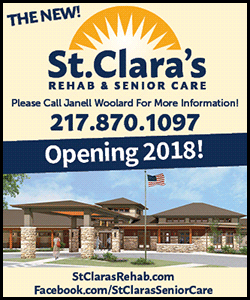Shopping for nursing homes more tricky in Trump era
 Send a link to a friend
Send a link to a friend
 [January 12, 2018]
By Mark Miller [January 12, 2018]
By Mark Miller
CHICAGO (Reuters) - Finding a safe,
high-quality nursing home for a loved one is never an easy task.
Complicated decisions often are made at a moment of emotional crisis and
reliable guidance can be difficult to come by.
And it is going to get more difficult. The Trump administration is
moving quickly to deregulate nursing homes, complying with a wish list
submitted by industry lobbying groups. Consumer advocates worry that the
changes will lead to deterioration in safety and the quality of care
delivered to some of the most vulnerable Americans.
Just before the holidays, news broke that the Trump administration is
curtailing the use of penalties against nursing homes that harm their
residents or put them at risk of injury.
The story, first reported in the New York Times (http://nyti.ms/2EcObyR),
is just the latest in a series of rapid-fire moves by the Centers for
Medicare & Medicaid Services (CMS) to loosen, delay or strip away
regulation of nursing homes.

In November, CMS exempted nursing homes that violate new patient safety
rules from financial penalties for 18 months. In June, it proposed to
reverse an Obama administration rule prohibiting clauses in residents’
contracts requiring them to use arbitration to settle disputes rather
than go to court.
“The industry sees this administration as a real golden opportunity to
get what it wants,” said Toby Edelman, senior policy attorney at the
Center for Medicare Advocacy (CMA), a nonprofit group that provides
Medicare-related education, advocacy and legal assistance to seniors.
CMS has broad authority to regulate nursing homes that accept patients
covered by Medicare and Medicaid - virtually all nursing homes in the
United States. Its recent moves will take an industry where enforcement
of rules has been weak, and make it weaker still, Edelman argues.
Nursing homes subject to the Obama penalty rules generally were limited
to those suspected of harming residents or placing them in immediate
jeopardy. The repeal of CMS guidance in this area will leave even these
nursing facilities facing looser regulation.
DOING THE HOMEWORK
Nursing home choices often are made during stressful times for families,
when a patient’s hospital stay is ending and the shift to a skilled
nursing facility is imminent. That leaves the door open to rapid,
emotion-driven decision making. “So don’t do that,” urged Robyn Grant,
director of public policy and advocacy at the National Consumer Voice
for Quality Long-Term Care.
“It’s really a good idea to do a little research before a crisis
emerges,” she said. “If something happened to me or a family member,
where do I want to go?”
Unfortunately, information rating the quality of nursing homes is
spotty. A good starting point is Medicare’s system for rating nursing
homes for quality of care and staffing levels, called Nursing Home
Compare (http://bit.ly/1CHwbuM). The system rates nursing homes on a
scale of 1 to 5 and is considered the industry authority.
[to top of second column] |

Hands are held in Sun City, Arizona, January 2013. REUTERS/Lucy
Nicholson

But much of the data that determines ratings is self-reported by nursing
homes, and the ratings do not take into account negative information
such as fines and enforcement actions by states. And reviews of this
system have found numerous cases of facilities attempting to “game” the
system.
One study published last year of California nursing homes between 2009
and 2013 found inflated star ratings. Forty percent of the facilities
received four or five stars in 2009, but that had risen to 60 percent in
2013. The researchers found little correlation between the ratings and
actual health inspections by state regulators.
Nursing home shoppers also should consult Nursing Home Inspect, an
online database created and maintained by ProPublica, the nonprofit
investigative news service (http://bit.ly/2mh8SCC). The database
contains state-by-state breakdowns displaying fines and deficiencies
turned up by inspections, and it flags nursing homes with histories of
serious quality issues.
Grant recommends checking on any facility you are considering with your
state’s long-term care ombudsman, a program administered by the
Administration on Aging. Consumer Voice offers a directory of state
ombudsmen on its website (http://bit.ly/1I1SgDp).
A trusted physician also can be a good resource, she said. “Ask them
about experience with facilities. Ask a trusted doctor, 'What facilities
would you go into if you needed one?'”
She also recommends checking with friends who have had experience with
facilities under consideration. Geriatric care managers - human service
professionals who help coordinate care for the elderly and their
families - also can help navigate the nursing home maze.

But consumer vigilance is an incomplete response to the rollback of
regulatory protections now under way. “We’re talking about one of the
most vulnerable populations in the country - many don’t have family
living nearby or don’t have family members at all who can look out for
them,” Grant said. And CMS data shows that 61 percent of nursing home
residents in 2014 suffered from moderate or severe cognitive impairment,
which means many will struggle to look out for their own interests.
“If you are concerned about the quality of care in nursing homes now,
you have no idea what will happen if we take away these protections.”
(Editing by Matthew Lewis)
[© 2018 Thomson Reuters. All rights
reserved.] Copyright 2018 Reuters. All rights reserved. This material may not be published,
broadcast, rewritten or redistributed. |